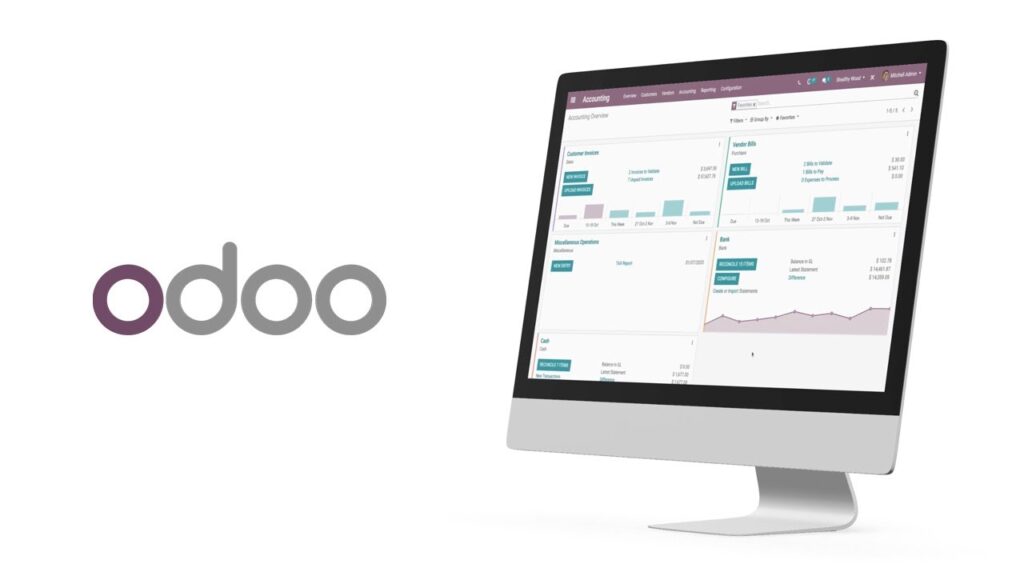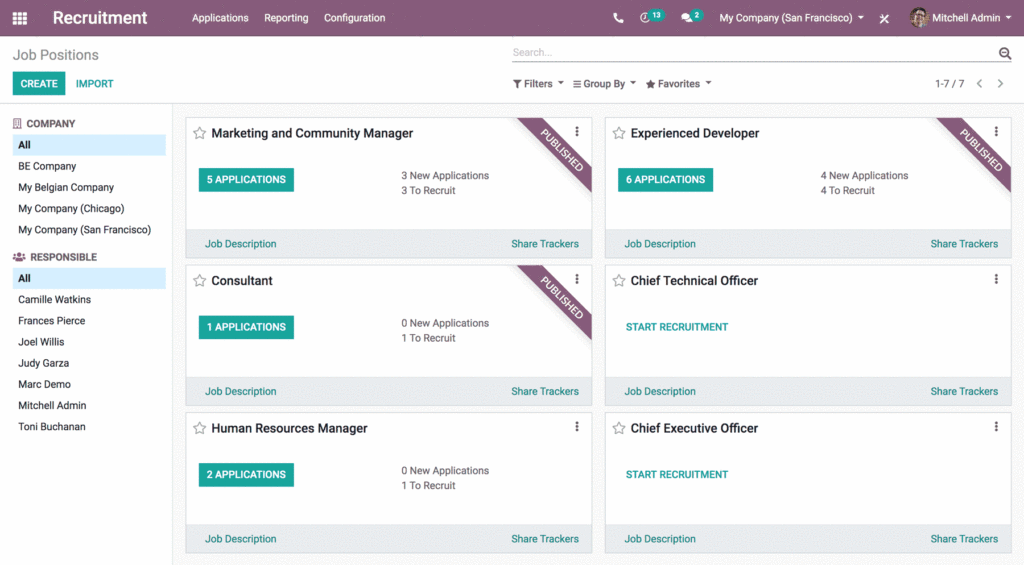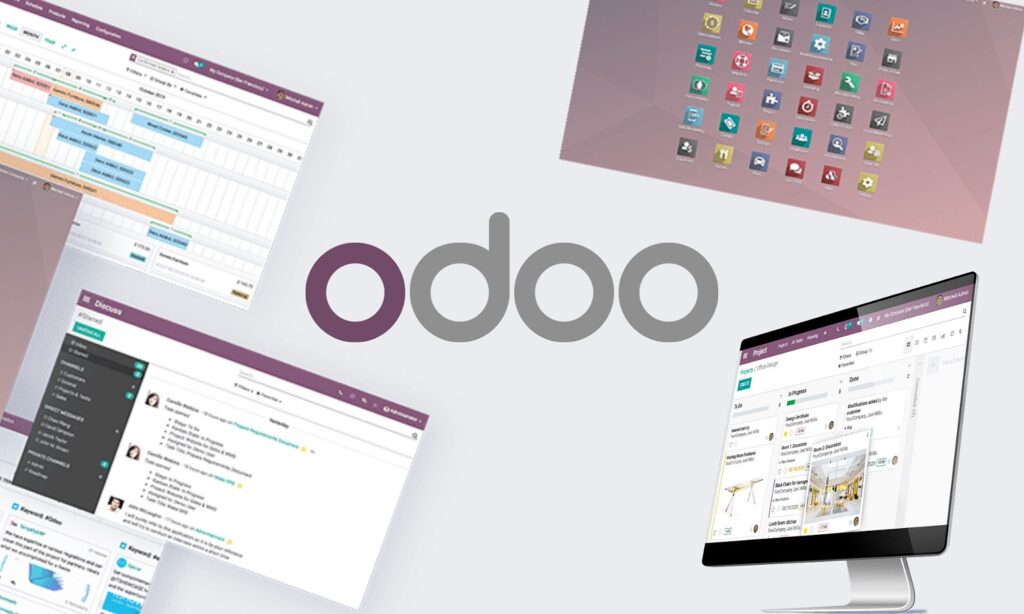Let’s share more Odoo vs. ERPNext. These two are popular ERP solutions for businesses of all sizes.
An enterprise resource planning (ERP) system is a software suite that integrates all the essential aspects of an organization’s business processes.
The aspects include accounting, manufacturing, sales, customer relationship management (CRM), and human resources.
ERP systems can help businesses to improve efficiency, reduce costs, and make better decisions.
What are Odoo and ERPNext?
Odoo and ERPNext are both open-source ERP systems. The source code for these systems is freely available for anyone to use, modify, and redistribute.
Open-source ERP systems offer many advantages over proprietary ERP systems, including:
- Lower cost: Open-source ERP systems are typically much less expensive than proprietary ERP systems.
- Greater flexibility: Open-source ERP systems can be customized to meet the specific needs of your business.
- Increased scalability: Open-source ERP systems can be scaled up or down to meet the needs of your business as it grows.
- Improved security: Open-source ERP systems are often more secure than proprietary ERP systems because the source code is available for review by security experts.
Why choose an open-source ERP?
There are many reasons why you choose an open-source ERP system. Here are a few of the most common reasons:
- Cost: Open-source ERP systems are typically much less expensive than proprietary ERP systems. The source code is freely available, so there are no licensing fees.
- Flexibility: Open-source ERP systems can be customized to meet the specific needs of your business. Change the system to add or remove features.
- Scalability: Open-source ERP systems can be scaled up or down to meet the needs of your business as it grows. You can add or remove modules as needed.
- Security: Open-source ERP systems are more secure than proprietary ones because their source code is open for review.
- Community support: The Open source community is large and has an active community of users and developers, so help is always available.
Ultimately, the best way to decide whether or not an open-source ERP system is right for you is to consider your specific needs and requirements carefully.
Suppose you want a cost-effective, flexible, scalable ERP system with high security and community support.
In that case, an open-source ERP system may be a good option for you.
Importance of selecting the right ERP solution for your business:
- Improved customer service:
A comprehensive ERP system enhances customer service by providing a holistic view of customer interactions and purchase history.
Enables your team to provide personalized and timely services, ultimately improving customer satisfaction.
- Scalability and growth:
Your ERP system should accommodate increased transactions, users, and complexities as your business grows.
Choosing an ERP solution with scalability in mind ensures that it can evolve alongside your organization’s needs.
- Competitive advantage:
A well-tailored ERP system can provide a competitive edge by streamlining processes, reducing lead times, and enhancing the quality of products or services.
You can position your business as an industry leader and improve market responsiveness.
- Data security and compliance:
ERP solutions handle sensitive data, so choose one with robust security to protect your data and comply with regulations.
- Integration of business functions:
Many organizations have separate systems for different functions, leading to data silos and communication gaps.
A unified ERP system integrates various functions, improving data flow and department collaboration.
- Cost savings:
While implementing an ERP system requires an upfront investment, the long-term cost savings can be substantial.
Automation of processes, reduction in manual errors, and better resource utilization contribute to significant cost efficiency over time.
- Real-time visibility:
With the right ERP solution, you gain real-time visibility into your business operations. This visibility allows you to track key performance indicators, monitor inventory levels, and identify potential issues before they escalate.
Odoo vs. ERPNext: Features, pricing, and support analysis
- Accounting:
Odoo and ERPNext provide comprehensive accounting modules, including ledger management, invoicing, and financial reporting.
Odoo’s accounting features are known for their flexibility, making adapting to different accounting practices easier.
ERPNext focuses on simplicity and ease of use in its accounting workflows.
- Inventory:
Odoo and ERPNext offer inventory management capabilities for tracking stock levels, managing warehouses, and handling procurement.
Odoo’s inventory module is highly customizable, allowing businesses to configure it according to their needs.
ERPNext offers integrated inventory management, tying inventory with other functions like sales and purchasing.
- Sales and Purchase:
Both systems facilitate sales order processing, quotations, and purchase order management. Odoo’s sales module includes advanced features like upselling and cross-selling.
ERPNext emphasizes an intuitive interface for managing sales and purchase workflows.
- Manufacturing:
Odoo and ERPNext cater to manufacturing processes, helping businesses plan production, manage bills of materials, and handle work orders.
Odoo’s manufacturing module is feature-rich, allowing for complex production scenarios. ERPNext focuses on streamlining manufacturing processes for simplicity and efficiency.
- Customer Relationship Management (CRM):
Both systems have CRM capabilities for managing leads, opportunities, and customer interactions.
Odoo’s CRM is closely integrated with its sales module. At the same time, ERPNext emphasizes ease of use and collaboration in managing customer relationships.
- Pricing comparison:
Odoo offers a free community version with essential features and an enterprise version with more advanced functionalities for a fee.
ERPNext has a business plan costing $50/month for small businesses, and you can contact them for a custom plan.
- Support:
Both systems offer community support through forums and documentation. Odoo provides paid enterprise support plans, ensuring timely assistance and updates.
ERPNext offers a subscription-based support model for businesses seeking professional assistance.
So which is best: Odoo vs. ERPNext?
Odoo and ERPNext each have distinct strengths and approaches. Odoo is customizable and feature-rich, suitable for complex businesses.
ERPNext focuses on simplicity, user-friendliness, and a fully open-source model, making it a solid choice for businesses looking for streamlined workflows.
Assessing your business needs and considering these factors will help you determine which ERP solution aligns best with your goals.
Also, have this in mind:
- Business size and complexity: Consider how big your business is and how complex your operations are. Odoo is excellent for both small and large businesses with diverse needs. ERPNext focuses on being straightforward and is well-suited for small to mid-sized businesses with simpler operations.
- Budget and total cost of ownership: Consider your budget for an ERP system. Odoo has both free and paid options. If you’re ready to invest in advanced features, Odoo’s paid version might be for you. ERPNext is entirely open-source, so there are no upfront license costs, but keep in mind other expenses like customization and support.
- Required features and functionality: List the features you need. Odoo offers a wide range of modules and customization, which is excellent if you need many specialized functions. ERPNext keeps things focused and user-friendly, which is ideal if you prefer simplicity.
- Customization needs: Consider how much you want to customize the ERP to fit your unique processes. Odoo allows deep customization, allowing you to tailor the system to your requirements. ERPNext is simpler to set up but might limit how much you can customize.
- Technical expertise: Think about your team’s technical skills. Odoo might need more technical know-how for in-depth customization. ERPNext is user-friendly, making it a good choice if your team could be more technical.
Sum up: Odoo vs. ERPNext;
Ultimately, the best way to decide which ERP system is right for you is to consider your specific needs and requirements carefully.
Odoo is a powerful, flexible ERP system with a large, active community. At the same time, ERPNext is a simple and easy-to-use ERP system with a smaller community.
Odoo offers additional features like project management, website building, and e-commerce. In contrast, ERPNext offers additional features such as healthcare and education management.
Choose the best and transform your business operations.






